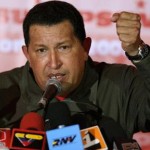Chavez's Christmas Coup
 Obama promised that his soft-spoken approach would help mobilize international support to oppose Chavez. His policy is about to be put to the test.
Obama promised that his soft-spoken approach would help mobilize international support to oppose Chavez. His policy is about to be put to the test.
When I visited Venezuela almost a year ago, one thing puzzled me:
Hugo Chavez is an ever more lawless ruler, an aspiring tyrant. Yet he conspicuously lacked the most essential tools of coercion. The police were weak and corrupt. The army was too independent. (And also weak and corrupt.) Chavez had not built a party militia or secret police force. Chavez ruled through the legacy institutions of the Venezuelan legal state: institutions Chavez had perverted and abused, but institutions still in some sense separate from him. Given the astonishing economic incompetence of the Chavez regime, the omission to build a repressive apparatus that owed loyalty to Chavez personally seemed a risky omission. If he lost an election, as he was soon bound to do, he risked losing his grip on power.
Chavez seems at last to have noticed that too.
The day before Christmas, Chavez at last dispensed with the pretense of legality.
Caracas, Venezuela — The National Assembly has approved a sweeping set of laws that impose penalties for spreading political dissent on the Internet, grant decree powers to President Hugo Chávez for 18 months and prevent legislators from breaking with his political movement. Despite an outcry here by critics, pro-Chávez lawmakers rapidly approved the measures in the closing weeks of the year, before a less pliant legislature convenes next month with a bigger opposition presence.
In 2010, Freedom House rated only one country in the Americas "unfree": Cuba. With this new step, Venezuela has caught up to Hugo Chavez's mentors. The media are controlled, their owners confiscated and then driven into exile. Private property is held only by sufferance, redistributed at a whim to Chavez's family and supporters. Now the internet will be even more tightly policed.
Under three administrations, it has been US policy to deny Chavez the adversarial relationship he so blatantly sought. If Venezuela is visibly disintegrating, it is not because the US has isolated or penalized Venezuela. Every morsel of Venezuela's trouble is Chavez's own personal creation. Yet Venezuela is becoming increasingly aggressive against its immediate neighbors - and the Venezuelan regime has shown itself highly sensitive to those neighbors' opinions. We hear a lot about how for example Brazil wants to exert some leadership in the hemisphere. Now's the time. The Obama administration promised that its more soft-spoken approach would mobilize other actors to cooperate more with the US than the Bush administration's unilateral approach. Here's the test.
Tweet